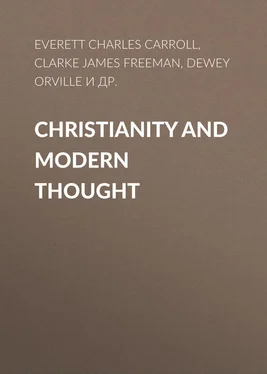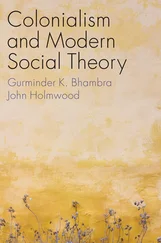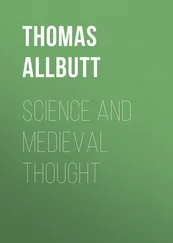Andrew Peabody - Christianity and Modern Thought
Здесь есть возможность читать онлайн «Andrew Peabody - Christianity and Modern Thought» — ознакомительный отрывок электронной книги совершенно бесплатно, а после прочтения отрывка купить полную версию. В некоторых случаях можно слушать аудио, скачать через торрент в формате fb2 и присутствует краткое содержание. Жанр: foreign_antique, foreign_prose, на английском языке. Описание произведения, (предисловие) а так же отзывы посетителей доступны на портале библиотеки ЛибКат.
- Название:Christianity and Modern Thought
- Автор:
- Жанр:
- Год:неизвестен
- ISBN:нет данных
- Рейтинг книги:5 / 5. Голосов: 1
-
Избранное:Добавить в избранное
- Отзывы:
-
Ваша оценка:
- 100
- 1
- 2
- 3
- 4
- 5
Christianity and Modern Thought: краткое содержание, описание и аннотация
Предлагаем к чтению аннотацию, описание, краткое содержание или предисловие (зависит от того, что написал сам автор книги «Christianity and Modern Thought»). Если вы не нашли необходимую информацию о книге — напишите в комментариях, мы постараемся отыскать её.
Christianity and Modern Thought — читать онлайн ознакомительный отрывок
Ниже представлен текст книги, разбитый по страницам. Система сохранения места последней прочитанной страницы, позволяет с удобством читать онлайн бесплатно книгу «Christianity and Modern Thought», без необходимости каждый раз заново искать на чём Вы остановились. Поставьте закладку, и сможете в любой момент перейти на страницу, на которой закончили чтение.
Интервал:
Закладка:
But when faith and worship have taken this true and independent tone, let them not join the foolish bigots, who think that because faith rests on other foundations than science, therefore it owes nothing to science and culture, and can wholly separate its fortunes and future from them. True, faith and culture , religion and science, in spite of their general and permanent agreement and connection, when they cannot get on honestly together, had better for the time separate; for they embarrass each other, and it is in their insulation that they sometimes ripen and prepare in separate crucible elements that are ultimately to blend in a finer compound than either ever knew before. Thus faith, driving science and culture out of her cell, and closing the doors on fact and observation, wrapt in devotion, has sometimes caught visions of God through her purely spiritual atmosphere, which sages in their laboratories have never seen. The great religious inspirations have not come from scholars, but from seers; from men of soul, not men of sense. "How knoweth this man letters, having never learned?" said his contemporaries of Christ. Well, he knew no letters, but he had what letters never teach, – divine wisdom! He knew God, that end of knowledge; he knew man, that last of philosophy. Faith therefore often recruits itself in a temporary divorce from science, just as Romanism profitably drives her priests into periodical retreats for prayer and exclusive meditations on God and Christ. It is beautiful to study even those humble and uninstructed Christian sects, whose simple and implicit faith is protected, yes, and exalted, by their providential indifference to science or unacquaintance with speculative difficulties. It is not their ignorance that kindles their devotion, but it is faith's vitality, which in certain exceptional natures and times beams and glows most purely, fed only on its own sacred substance. When you have reached the inner kernel of a true Moravian, or even a true Catholic heart, and found a solid core of faith, unsupported by any other evidence than that which the Scripture described in the words, "Faith is the substance of things hoped for, the evidence of things not seen," you have gone far towards fathoming the holiest secret in our nature, the well of living water. And, on the other hand, how much better, both for faith and science, that science should, at a time like this, go without religious ends into physical or metaphysical pursuits, investigate, inquire, test, question, in absolute independence of theological or spiritual results. It is only when thus free and bold and uncommitted that her testimony is worth any thing. Think of Newton, meditating and exploring the solar system, in the simple love of truth, without let or hindrance from ecclesiastical intermeddlers, and compare him with Galileo, lifting his telescope under the malediction of the priesthood of Rome.
No: let science be as free as light, as brave as sunbeams, as honest as photography! Encourage her to chronicle her conclusions with fearless and unreproached fidelity. She will doubtless make many things which have been long associated with religion look foolish and incredible. But it is only so religion can shed some husks, and get rid of some embarrassments. It is, in short, only just such assaults and criticisms from science and experience that ever induces religion to strain out the flies from her honey; to dissociate what is accidental in faith from what is essential and permanent. And, when science and culture have gathered in the full harvest of this wonderful season of discovery and speculation, we may expect to find faith stripped of many garments, now worshipped, which ignorance and fear put upon her for protection and defence; but really strengthened in substance, by the free movements allowed her lungs, and the dropping of the useless load upon her back. Then, too, science and philosophy will again resume their places at the feet of the master-principle in our nature, until again driven away, by new disagreements, to return again by the discovery of a finer harmony.
Self-culture will never supersede worship, more than golden lamps burning fragrant oils will ever supersede the sun; more than digging and hoeing and planting will supersede sunshine and rain from heaven. Self-culture? Yes: by all means, and in any amount, but not as an end. When people look to ornamental gardening for the crops that are to feed the famine-smitten world, and not to the pastures and prairies, as they lie in the light of the common sun, they will look to self-culture for the characters, the hearts, the souls that glorify God and lift and bless the world. "Thou shalt love the Lord thy God with all thy heart, and thy neighbor as thyself." That is the irrepealable law of growth. "Seek first the kingdom of God and his righteousness, and all other things shall be added unto you." Worship, faith, duty, devotion to God, Christ, humanity, to justice, freedom, truth, – these, and not self-culture, have lifted the race and the world. Learn, acquire, cultivate, improve, develop yourselves, by art, music, reading, languages, study, science, experience, but do it all in seeking to know and love and serve God and man. Seek to know Christ, and you will learn more, indirectly, than though you sought all knowledge without this thirst. Seek to know God, and you shall find all science and culture healthful, sacred, harmonious, satisfying, and devout.
The break between modern thought and ancient creeds and worship, thus considered, though serious, and worth the utmost pains to heal, by all arts that do not conceal or salve over, without curing the wound, is not permanently discouraging to earnest and well-considered Christian faith. Nor are all the signs of the times one way. For – after all that has been said about the restless and dissatisfied condition of the critical and conscious thought of the time, and the scepticism of the learned, or the speculative class, or of the new thinkers born of the physical progress of the age, and the decay of worship in the literary and artistic, the editorial and poetical circles – it remains to be said, that, leaving this important and valuable body of people aside, – not badly employed, and not without personal warrant for their doubts and withdrawal from positive institutions, – there remains a mighty majority, on whom the Christian religion and historical faith and the external church have a vigorous and unyielding hold; whose practical instincts and grand common-sense and hereditary experience anchor them safely in positive faith, while the scepticism raves without and blows itself clear, and passes over. Christianity first addressed itself to common people, not to avoid criticism, but to secure the attention of the moral affections and the spiritual powers, instead of the meaner understanding. It has lived on the heart and conscience and needs and yearnings of the masses, from and to whom practical wisdom and fixed institutions and simple faith always come and always return. Common sense is not the sense that is common, but the sense that is in common. And popular faith is not the faith of private ignorance massed, but of that wisdom which alone enables ignorant people to find a basis for feelings and actions that all feel to be beyond and above their private ignorance or self-will. The common people were the first to hear Christ gladly: they will be the last to hear any who deny him.
It is easy to exaggerate the decline of modern faith, and to misread the tendencies of the time on which we have been dwelling. Thus, paradox though it seem, it were just as true to say that more people are deliberately interested in Christian faith and worship to-day than at any previous era in the history of our religion, as to asseverate that more people doubt and regret it than ever before. Both statements are true; and they are reconciled only by the fact that it is only in this century that the claims of faith and worship have been popularly debated, or that the people were expected or allowed to have any independent opinion about them. The general soil of our humanity is for the first time surveyed and sown; and it is found that, with more wheat than ever, there are also more tares . With more intelligent and convinced worshippers, there are more wilful or logical neglecters of worship; with more genuine believers, more sceptics; with more religious activity, more worldliness. Without an army in the field, there will be no deserters; without a common currency of genuine coin, no counterfeits; without a formidable body of affirmers, few deniers.
Читать дальшеИнтервал:
Закладка:
Похожие книги на «Christianity and Modern Thought»
Представляем Вашему вниманию похожие книги на «Christianity and Modern Thought» списком для выбора. Мы отобрали схожую по названию и смыслу литературу в надежде предоставить читателям больше вариантов отыскать новые, интересные, ещё непрочитанные произведения.
Обсуждение, отзывы о книге «Christianity and Modern Thought» и просто собственные мнения читателей. Оставьте ваши комментарии, напишите, что Вы думаете о произведении, его смысле или главных героях. Укажите что конкретно понравилось, а что нет, и почему Вы так считаете.












